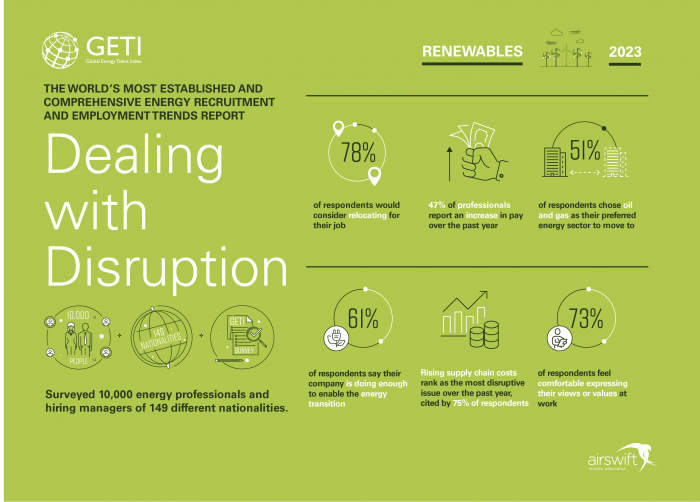The seventh annual Global Energy Talent Index (GETI), the world’s most established and comprehensive energy workforce trends report, released today, has revealed that surging fossil fuel prices are driving a skills exodus from renewables to oil and gas that could hinder the energy transition.

The report* details how, as fossil fuel firms reap bumper profits from recent energy price rises, oil and gas has overtaken power as the destination of choice for over half of the renewables workforce.
Indicating an increasingly restless workforce, 87 per cent would consider leaving their current role and 51 per cent would move to oil and gas – a 14 per cent increase on last year. Pay is cited as the biggest driver of job dissatisfaction for 59 per cent of renewables workers, followed by benefits at 50 per cent, indicating that soaring fossil fuel salaries and perks are a major draw.
Renewables firms also face intensifying demand for their workforce, with 78 per cent of green energy workers being headhunted for a new job and nearly a third receiving six or more approaches from recruiters in the last year. With the increasing adoption of digital technologies across renewables, a quarter of workers say they would leave the energy industry, and technology is now the most popular outside industry to join.
Janette Marx, CEO of Airswift, says: “The energy transition will hinge on our green skills base, yet renewables talent is increasingly restless and in demand from outside sectors. Fossil fuel firms are becoming more popular among renewables workers by improving their ESG performance as well as pay. Renewables workers are also the most likely to care about their employers’ values, but this now goes beyond the environment and encompasses metrics such as their contribution to society and workplace flexibility. Green energy firms will now have to compete with fossil fuel firms on a wider range of metrics from societal impact to flexibility by creating more meaningful roles with KPIs linked to social as well as environmental contributions, and by reducing fixed hours and physical deployments.”
Further key findings within renewables include:
- North America has risen to second choice destination for overseas transfers in the wake of the Biden administration’s funding for wind power, second only to Europe, the world leader in renewable energy.
- When asked what drives job satisfaction, nearly half of renewables respondents point to the feeling that they are contributing to society, followed by flexible working on 39 per cent.
- Half feel that their concerns are listened to and have an impact on company policy – the highest proportion among any energy sector.
Susan Koch, Chief Operating Officer & VP of Accounting at Carbon Engineering, says: “The ability to make a meaningful contribution is a major driver of job satisfaction for renewables workers, so it’s really encouraging to see many feel they can drive company policies. The pace of renewables innovation, and the need to fail forward to combat climate change, means that ideas are actively encouraged in the sector. With oil and gas enjoying a bounceback, renewables firms will have to compete on other criteria beyond salaries such as offering diverse, democratic, and inclusive workplaces.”
Airswift interviewed sector experts and surveyed 10,000 energy professionals and hiring managers of 149 nationalities across five industry sub-sectors: oil and gas, renewables, power, nuclear and petrochemicals.
*Report from by Airswift









